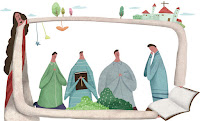In an article in the Diagnosis of the Times column of the Catholic Peace Weekly a Human Rights Lawyer begins expressing disappointment that in recent years invitations to talks in parishes have decreased greatly. He would use the occasion to gather funds for human rights organizations in the country.
The Catholic Church in response to the demands and concerns of the times, the Catholic Human Rights Commission together with clergy, religious, and laypeople are working to protect the rights of the marginalized and those whose human rights are violated. It is a community that is active.
In the midst of a flood of good words, we must always ask ourselves what kind of love are we talking about with our bodies and minds. The lawyer can't forget the verses of a poem that a priest quoted in a talk to the elementary school children.
"You say you love the flowers in the field, and you pick them.
You say you love a flying bird and lock it in a cage.
You say you love the fish in the pond, and you eat them.
I'm afraid when you say you love me.
What does it mean when you say you love me?"
The Bible's words are that we should not oppress strangers because we also were once strangers. We should consider them as part of us, and we should love them like ourselves which is not our reality.
Originally, there was no closed society, only a closed mind in a busy and hectic world. There is only vague anxiety, prejudice, turning away in weakness with selfish ideas, and cowardice that comes from being buried in everyday life even though we know something is wrong. What is wrong must be corrected. We should always know how to be sad and angry and express it with our bodies and mind when we see humans being abused.
Prayer for World Peace is a regular part of the prayers offered by believers at Mass. We are asked where is the "world", what is "peace", and whether we sincerely "prayed" with all our heart, mind and tried to live what we prayed. Crimes such as anti-democratic tyranny, the slaughter of minorities, torture, forced migration, and forced labor are committed without hesitation, and some companies are involved, seeking only profits.
There can be no peace in our lives and in the world when we fight for our lives over "bread and fish" so that everyone can eat, and at the same time perform "miracles" of science while many people die of starvation. We must pray for world peace with a humble and fearful heart.
He recalls the contents of a lecture tape by an American pastor. "There is a refinery of Korean crude oil. Numerous trucks load huge amounts of crude oil and enter the factory, but all trucks that come out are empty trucks. This is because all refined crude oil is used to operate the factory. This is what our church looks like today." We reflect on whether we, our family, our society, and our church are living by forgetting our dreams, lack of sharing, and many precious things under the pretext of being concerned with the finer things of life.
"There is no one poor enough not to give love, and no one rich enough not to need love." What about a small human rights practice before the end of this year? Meaningful donations to human rights organizations such as the Catholic Human Rights Commission of Korea. Showing a warm heart to those working in the field of cold human rights is also good. In the field of human rights, there is always something to do.






